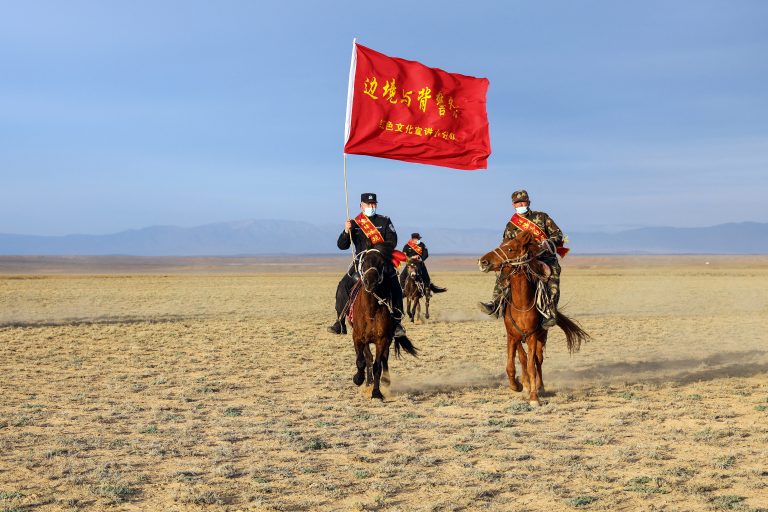The People’s Republic of China (PRC) was one of the first countries to rush forward to legitimize the Taliban takeover of Afghanistan, with Foreign Ministry spokeswoman Hua Chunying said that Beijing will “respect the wishes and choices of the Afghan people.” According to an article published in the state-run Global Times, Chinese firms are now preparing to “monetize” from Taliban rule.
“While much uncertainty remains, given the fluid situation in Afghanistan, there are huge opportunities for mutually beneficial cooperation between the two countries, especially in sectors such as utilities and mining, if the country under the Taliban’s leadership pursues peace and development after years of war… The Taliban held an open attitude toward cooperation with China, even before it entered Kabul,” the article stated.
As of 2020, Chinese businesses held infrastructure contracts worth $110 million in Afghanistan. Many large projects have been stalled due to regional instability. Petrochina, a state-backed oil, and gas company won a contract to develop oil fields in Sar-i-pul and Faryab. The deal, which is valid for 25 years, was signed 10 years ago in 2011. But the project has been inactive.
In 2007, China Metallurgical Group Corp (MCC Group) won the right to mine deposits at the Aynak Copper Mine project for 30 years. The site is the world’s second-largest copper mine. The project remains non-operational due to safety issues.
China is also investing in Afghanistan’s power sector. In May, a group of PRC companies planned to invest $400 million into a coal-powered electricity generation project. The plant will raise the country’s power generation capacity by 50 percent and will have an installed capacity of 300 megawatts. The project is yet to be finalized.
Success
You are now signed up for our newsletter
Success
Check your email to complete sign up
The article noted that there is a “major power shift” in Afghanistan following the U.S. withdrawal. It enables Chinese projects to resume with more “win-win cooperation” between the two countries. In a meeting with PRC officials on July 28, Taliban political commission representative Mullah Abdul Ghani Baradar expressed hopes that China would be more involved in Afghanistan’s economic development.
Mining opportunities
Communist China is interested in Afghanistan because it’s a treasure trove of mineral deposits. That includes rare earth elements which are critical in the production of computer chips that power high-tech devices. GPS systems, drones, hypersonic missiles, stealth aircraft, satellites, electric vehicles, and wind turbines all use rare earth elements at some stage of production.
Former Brexit party leader Nigel Farage wrote in an opinion piece published in Newsweek that salt, gold, and oil historically have been essential to global economies; now, it’s lithium, an industrial metal critical to building electric vehicle batteries. Afghanistan has some of the largest deposits of lithium in the world, with an estimated worth of $1 trillion to $3 trillion.
“The bad news is that Joe Biden’s decision to pull American troops out of that country has unilaterally—and literally—handed all of the potential bound up in those lithium deposits to Chinese communists,” Farage writes.
Lithium deposits in Afghanistan were first discovered by the Soviet Union in the 1980s, a time when demand was relatively low. A Pentagon memo from 2010 stated that Afghanistan could become the “Saudi Arabia of lithium.”
China is already the global leader in rare earth production. Almost 35 percent of the world’s rare earths reserves are in China, and the country accounts for 70 percent of global production. If Beijing is able to build a strong influence in Afghanistan, the communist regime could strengthen its hold on the global rare earths industry.
Threats to expansion
While Beijing wants to exploit economic opportunities in Afghanistan, it is also aware of potential perils that come with the territory. Just hours after expressing hope that the Taliban would build an “open and inclusive” Islamic government, the PRC issued a warning that the country should not become a breeding ground of radical elements.
“Afghanistan must never again become heaven for terrorists. This is the bottom line that must be held firmly for any future political solution in Afghanistan… We hope that the Taliban in Afghanistan will earnestly deliver on their commitments and make a clean break with the terrorist organizations,” Geng Shuang said in an emergency meeting at the UN Security Council. He is China’s deputy permanent representative to the United Nations.
Beijing is worried about regions like Xinjiang, where the Chinese Communist Party (CCP) persecutes Uyghurs and other minorities. Islamist movements might get flared by Afghanistan’s support. A group seen as a major threat by the CCP is the East Turkestan Islamic Movement (ETIM) which is said to be an affiliate of al-Qaeda.
A recent UN report warned that several hundreds of ETIM militants were gathering in the country. The Xinjiang region shares borders with Afghanistan, which makes the movement of such insurgents between the two nations easier.














